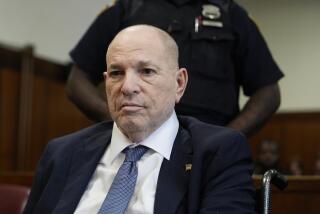Fate of Harvey Weinstein sexual assault cases now in hands of two cautious prosecutors
After months of investigating, a handful of criminal cases involving Hollywood mogul Harvey Weinstein are now in the hands of two veteran but cautious prosecutors: Los Angeles County Dist. Atty. Jackie Lacey and Manhattan Dist. Atty. Cyrus R. Vance Jr.
In Los Angeles, the investigation is focused on an Italian actress’ allegation of rape in 2013. In New York, detectives have turned their attention to a student-actress’ accusation she was forced to orally copulate the producer in 2004 and another actress’ allegation of rape in 2010.
Both teams of detectives say they could move forward with charges against the movie producer, who since last fall has been accused by more than 85 women of sexual misconduct stretching back four decades.
Vance is getting pressure as the New York City Police Department has gone public with its hopes that prosecutors file charges.
“I’ve spoken with the police, and I can tell you we are working very hard with them to complete the investigation,” Vance said last week. “We’ll take the time it will take to get it done right.”
NYPD detectives have publicly said they are close to making an arrest and would do so if Weinstein was in New York City.
“We are still accumulating evidence. It’s going very, very well,” NYPD Chief of Detectives Robert Boyce told reporters recently. “We have a lot of information. We have people who are getting ready to go to grand jury.”
Weinstein’s representatives say the accusations are not supported by evidence in either New York or Los Angeles. “Mr. Weinstein’s criminal attorneys Blair Berk and Benjamin Brafman have said that a fair investigation of the allegations of criminal wrongdoing will prove they are without merit,” a statement for this article said.
Brafman rebuffs any suggestion that a prosecution is coming soon in New York. “I have been assured the filing of criminal charges in New York against Mr. Weinstein has not been authorized and his arrest is not imminent,” he said in a statement.
Vance’s office said it had insufficient evidence to charge Weinstein for a misdemeanor sex crime. Ambra Battilana Gutierrez reported to police that Weinstein groped her without her consent. She then wore a wire for the NYPD on which Weinstein can be heard to say, “I won’t do it again.”
Vance, the son of the former secretary of State under President Carter, is a well-connected political player whose ties to the city’s elites have caused some to question his decisions in celebrity and high-profile cases.
In the 2015 Weinstein investigation, the movie mogul’s attorneys included Elkan Abramowitz, Vance’s former law partner and a donor to his campaign. Vance has denied any connection between the donations and his actions. Time’s Up, a defense fund and pressure group acting as a voice for victims of sexual harassment, has called for New York Gov. Andrew Cuomo to investigate Vance’s handling of the case.
Vance’s handling of high-profile cases was tested early in his tenure with the 2011 indictment for sexual assault of Dominique Strauss-Kahn, a French politician who until his arrest on suspicion of attacking a hotel maid headed the International Monetary Fund. With worldwide media attention, Vance, however, dismissed all of the charges with his office, saying it was unable to prove “her version of events beyond a reasonable doubt, whatever the truth may be about the encounter.”
Since a New York Times expose last fall of Weinstein’s sexual behavior, Annabella Sciorra, Asia Argento and Rose McGowan have all accused Weinstein of brutal sexual assaults while many of his leading actresses have told of his sexual misconduct and their fear. It spawned the #MeToo movement of women coming forward with allegations of sexual assault and harassment that have seen dozens of Hollywood and media executives lose their jobs and status and face criminal investigations.
But much of Weinstein’s alleged behavior is shielded from prosecutors by statutes of limitations on sex crimes that meant some allegations are too old to charge. For Los Angeles or New York prosecutors, only a few investigations have emerged as the most viable for criminal charges.
In New York City, the investigation involves former aspiring actress Lucie Evans, who alleges Weinstein forced her to perform oral sex on him in 2004 while she was a senior at Middlebury College. Evans had gone to the Tribeca offices of Miramax for a potential casting.
“I said over and over. ‘I don’t want to do this, stop, don’t,’” she says of the attack in an interview with the New Yorker. She told the magazine the incident which began when she met Weinstein at the Cipriani Upstairs nightspot, where he offered her professional guidance.
Evans’ allegations are one of five separate sexual assault allegations against Weinstein. Special Victims Unit detectives are also investigating accusations levied by actress Paz de la Huerta that she was raped twice by Weinstein in 2010. De La Huerta told Vanity Fair that Weinstein raped her at her apartment in November and then again the following month.
Vance has also spent months examining Weinstein’s finances regarding his use of nondisclosure agreements to hide his alleged attacks and his use of covert operatives to dig into his accusers.
Weinstein’s representatives have repeatedly said that the producer did nothing more than ensure that the facts are presented fairly.
In Los Angeles, an experienced sex crimes deputy district attorney from a special task force recently spent more than three hours interviewing the actress who alleges Weinstein raped her at Mr. C Beverly Hills hotel in February 2013 as part of a heavy vetting process by prosecutors, according to several sources.
Lacey, the Los Angeles district attorney, is a career prosecutor who rose up through the ranks to be elected the county’s first female and African American prosecutor in 2012. She is known for being cautious and far less outspoken than her predecessor and mentor, Steve Cooley.
Lacey, nonetheless, established a special sex crime task force for the celebrity cases as the allegations against Weinstein and others expanded. In contrast to Vance, Lacey has remained tight-lipped, declining to comment on the progress of the investigation last week.
Her office’s highest-profile cases involve murder charges against real estate heir Robert Durst and music producer Marion “Suge” Knight. The L.A. district attorney has a mixed record in high-profile celebrity prosecutions. Failed murder cases against O.J. Simpson and Robert Blake were considered black eyes. But L.A. prosecutors did win a conviction against music producer Phil Spector.
LAPD Capt. Billy Hayes, who oversees the department’s elite Robbery-Homicide Division, which has been handling the Weinstein matter, said the investigation and review are about thoroughness, not speed, but his detectives are in contact regularly with counterparts in New York, London and Beverly Hills.
According to law enforcement sources, L.A. detectives say the evidence is promising because the woman told her story to three people, including her priest, relatively soon after the alleged attack. LAPD detectives also have obtained bills showing she was at the hotel at the time, said the sources, who spoke on the condition of anonymity because they were not authorized to discuss it publicly.
In October, the actress, now 38, provided LAPD detectives with what she said was a moment-by-moment account of how Weinstein had “bullied” his way into her hotel room in 2013 and attacked her. She repeated that for a prosecutor last month.
The actress, who has asked not to be publicly identified because she was fearful of retaliation and concerned about protecting her children’s privacy, told The Times last year that she and Weinstein had spoken briefly on the evening in question at the Los Angeles Italia Film, Fashion and Art Fest. Later, she said, he showed up “without warning” in the lobby of her hotel — which surprised her because she didn’t tell him where she was staying. He asked to come up to her room. She said she told him no and offered to meet him downstairs, but soon he was knocking on her door.
“He ... bullied his way into my hotel room, saying, ‘I’m not going to [have sex with] you, I just want to talk,’” the woman told The Times. “Once inside, he asked me questions about myself, but soon became very aggressive and demanding and kept asking to see me naked.”
She said Weinstein repeatedly bragged about his power and influence and told her not to fight him. She tried to show him pictures of her children as she cried and begged him to go away, she said.
“He grabbed me by the hair and forced me to do something I did not want to do,” she said. “He then dragged me to the bathroom and forcibly raped me.”
She did not tell authorities about the incident at the time, so no rape kit was taken. As a result, the law enforcement source said, there is little physical evidence in the case.
Of the three Weinstein cases submitted by the LAPD to the district attorney, two are outside the statute of limitations. One is a rape accusation and another a lewd acts allegation. But the accusers’ stories could be used if the producer were charged in another case.
Twitter: @lacrimes
More to Read
Sign up for Essential California
The most important California stories and recommendations in your inbox every morning.
You may occasionally receive promotional content from the Los Angeles Times.










